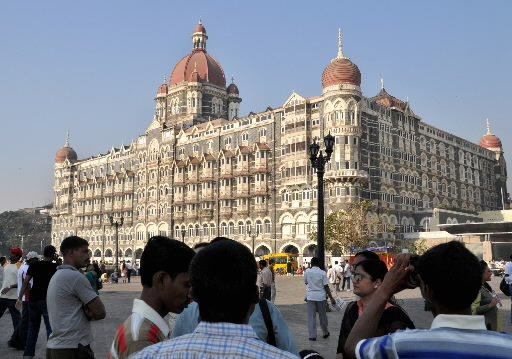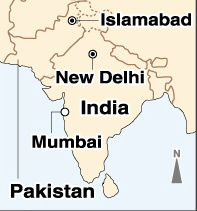Nuclear weapons can be eliminated: Chapter 2, Part 2
Apr. 9, 2009
Chapter 2: South Asia’s cold war
Part 2: Shock of 11/26
by Junichiro Hayashi, Staff Writer
Military tension brought by terrorism
Last November 26, Mumbai, India’s largest city, became the target of Islamic extremists. The city’s train station came under attack, and flames spewed from the Taj Mahal Hotel, which overlooks the Arabian Sea. The terrorist attack claimed 165 victims, including one Japanese.
When I visited recently there were many tourists and it seemed as if the tragedy of three months before had never happened. But in the bustling city journalist Jatin Desai, 53, furrowed his brow and said, “Everyone feared the worst then.”
From the very beginning, the Indian government claimed that the attack was the work of a Pakistani terrorist organization, and it was whispered that the Pakistani military intelligence was involved. In mid-December the Indian Air Force invaded Pakistan’s airspace. Tension rose with fears of a military conflict.
The international community took action. Leading figures from nations around the world, including then U.S. Secretary of State Condoleeza Rice and British Prime Minister Gordon Brown, went to South Asia to arbitrate. Sukla Sen, 59, a peace activist in Mumbai, said, “That showed that the world feared that India and Pakistan might start a nuclear war.”
Despite those concerns, both countries take a positive attitude toward nuclear weapons and the threat they pose.
Mr. Sen said sarcastically, “The Indian government believes, without a doubt, that the possession of nuclear weapons by both countries has ensured stability.” Abdur Rehman, an assistant professor at the National Defence University in Islamabad who specializes in international relations, said as well, “Both the government and the people believe that nuclear weapons create a military balance and prevent all-out war.”
India is about four times the size of Pakistan. According to the Stockholm International Peace Research Institute, in 2007 its military expenditures were 5.6 times those of Pakistan. Nuclear weapons allow Pakistan to make up for that difference.
“Japan didn’t have nuclear weapons, so it could do nothing to prevent the U.S. from dropping the atomic bombs. That’s how many people in Pakistan see it,” said Mr. Rehman. “Most people in Pakistan know nothing about the devastation caused by the atomic bombings of Hiroshima and Nagasaki. To them it’s something that happened in a place very far from here.”
Mr. Rehman studied at Hiroshima University for four years through 2007. Since returning to Pakistan, he has shown the film “Barefoot Gen” to students and called for establishing peace without a dependence on nuclear weapons.
“Some people feel that nuclear deterrence prevented the outbreak of war,” he said. “But the delicate balance between terrorism and nuclear war is a negative peace that is fraught with danger.”
(Originally published on March 21, 2009)
To comment on this article, please click the link below. Comments will be moderated and posted in a timely fashion. Comments may also appear in the Chugoku Shimbun newspaper.









